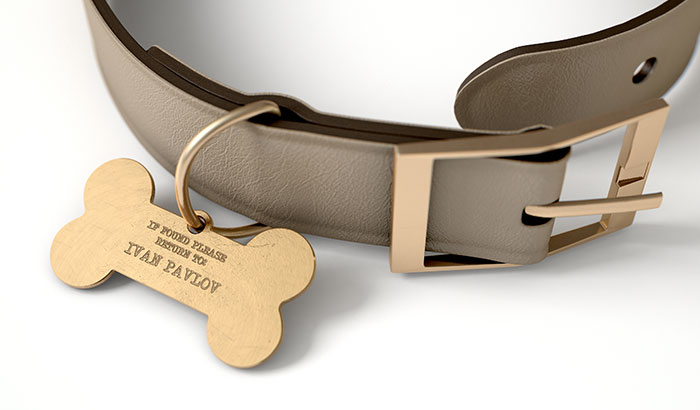Pet tags help others identify your pet in case they’re lost. While pet tags are generally engraved with the pet’s name, have you ever wondered if you’re missing vital information that could be helpful?
Aside from their name, some other useful bits of information you can put on your pet’s name tag include your phone number, medical conditions, microchip number, current vaccinations, and a warning if there’s a possibility your pet may become aggressive toward another person or animal.
This article will detail why you should consider including this information on your pet’s name tags and how doing so will help you keep your pet safe and returned if they are lost.
The Benefits of Pet Tags
Pet tags for dogs and other pets are a must if you want to ensure your pet’s safety and prompt return in case they get lost. Pet tags are beneficial in the sense that they are:
- Inexpensive.
- Easy-to-purchase and customize.
- Easy-to-read.
- The quickest way to identify your pet.
1.Pet’s Name
Your pet’s name is the most important thing to include on their tags. This information allows people to quickly identify your pet and call out to them if they happen to get out of your home. Ensure you get pet tags engraved in legible fonts to make it easy for anyone to read.
You can also include your pet’s nickname, especially if they respond to it.
2.Owner’s Name and Phone Number
Your phone number is a crucial piece of information to include on the name tag, as it allows anyone who finds your pet to contact you easily. The name and phone number should be written clearly and in a way that is easy to read, whether that be in print or cursive, just the same as their name.
It’s also a good idea to include your address, especially if you live in a small town or rural area.
It’s also essential to keep your contact information up-to-date, so update your pet’s tag if you move or change your phone number.
Though not typical, you may include your email address as alternate contact information in case the finder cannot reach you by phone or if you are traveling and unable to receive calls.
3.Any Medical Needs or Conditions
Getting your pet tags engraved with medical information is vital if your pet suffers from medical conditions that require attention.
Examples of medical needs or conditions that you may want to include on the name tag are:
- Medications that your pet is currently taking.
- Allergies.
- Chronic conditions such as diabetes or epilepsy.
- Special diet requirements.
- Recent surgeries.
- Blindness or deafness.
It’s also a good idea to include the name and contact information of your pet’s veterinarian if the person who finds your pet needs to contact them for any reason.
4.Microchip Number
A microchip is a small chip implanted under your pet’s skin and contains a unique identification number. This number is linked to a database that contains your contact information so that if your pet is lost and found, the finder can scan the microchip and contact you.
It is important to remember that having a microchip implanted in your pet is not a substitute for having a collar with a name tag, as the collar and tag are usually the first things that someone will look for when they find a lost pet.
5.Current Vaccinations and Licensing (if applicable)
Vaccinations are essential to protect your pet from various diseases and other animals and humans from diseases that your pet may carry. Some municipalities may have laws mandating certain vaccinations for pets, such as rabies.
It’s good to have proof of the vaccinations on the tag. This way, the finder can know that the pet is protected and not a threat to public health.
6.An Alternate Contact Name and Phone Number
Alternate contact information is critical to include on the name tag, as it provides a backup way for someone to contact you if they find your pet.
An alternate contact name and phone number can be a friend, family member, or a neighbor, someone who is likely to know your whereabouts or how to contact you if you are unavailable. This information can be especially important if you are traveling or on vacation and unable to be reached by phone.
You should also include an alternate contact name and phone number if you work long hours or are frequently away from home, as it increases the chances that someone will be able to reach you if your pet is found.
7.A Warning If Your Pet is Aggressive and a Reward for Return
If your pet has a history of aggression or biting, it’s important to include a warning on the tag so that the finder can take the necessary precautions. This can help prevent accidents or injuries, especially if the finder is not familiar with your pet or if they have children or other pets.
It’s also a good idea to include a warning if your pet has any other behavioral issues that may be of concern. Such as if the pet is shy or anxious or requires special handling or training.
It’s important to note that this warning is not a sign of a bad pet but a way to ensure that the finder knows how to handle the pet to avoid any potential issues.
It’s also a good idea to include a reward for the return of your pet to increase the chances of getting it back.
Get Your Pet’s Name Tags From Naag Tag
Are you looking for unique engraved pet tags? Naag Tag specializes in engraving name tags, nameplates, LDS products, and even pet tags for a quality product you can proudly display.
Contact us today if you have questions about our products by calling us at 1-877-408-0210, filling out our online form, or emailing us at naagtag@naagtag.com.

